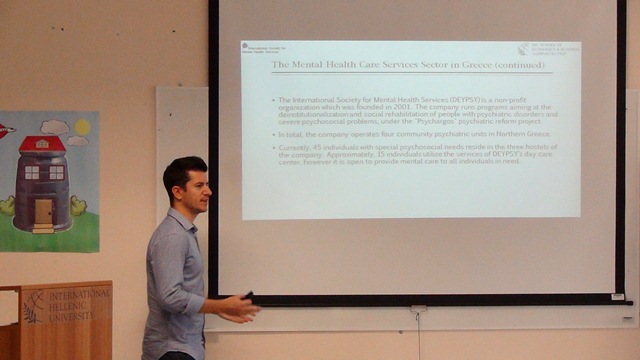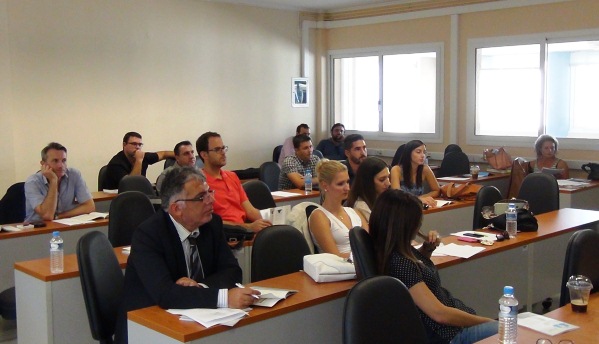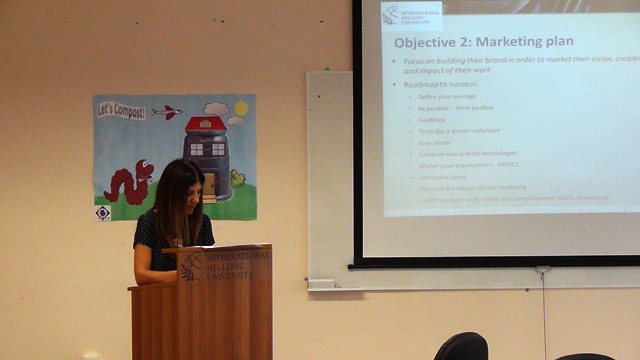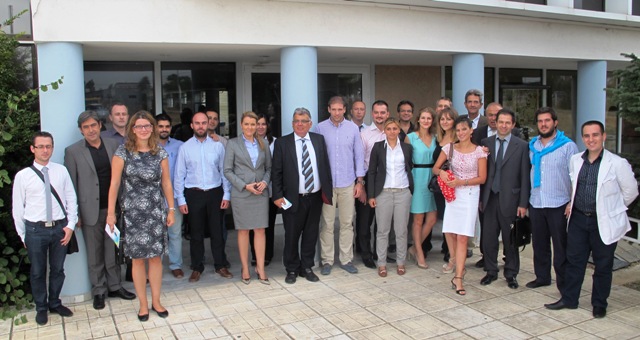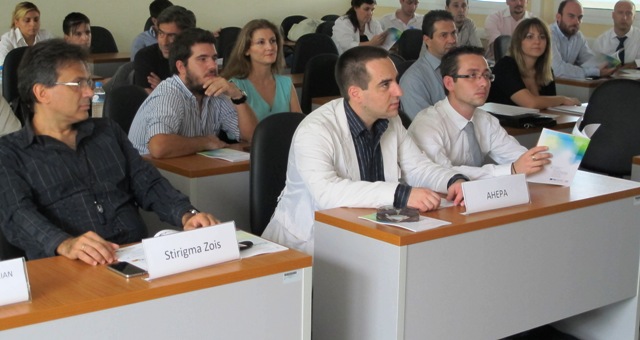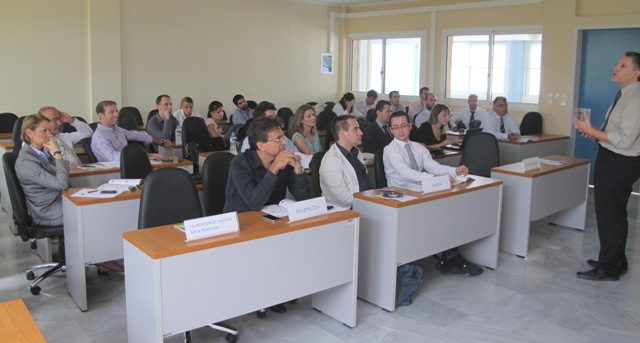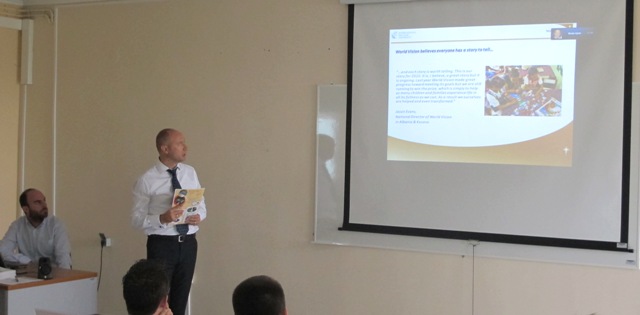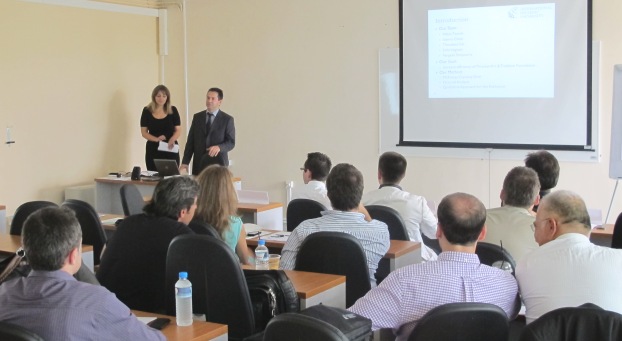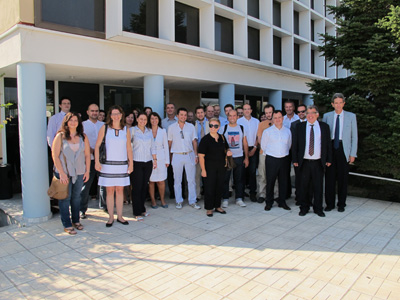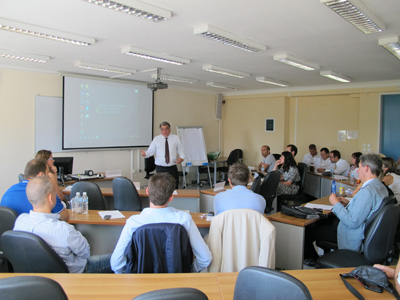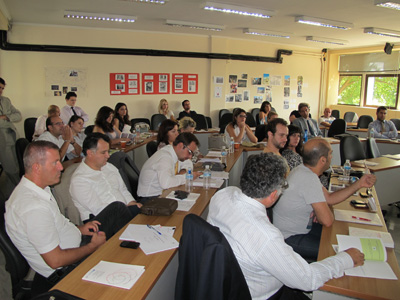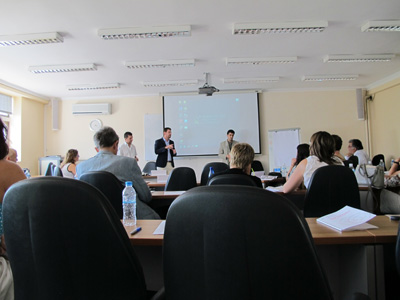The IHU Executive MBA Field Trip project
Course Outline
The field trip project is an integral part of the Executive MBA programme. During the second year of their studies Executive-MBA students at International Hellenic University are required to complete the Field Trip Project.
The field trip not only helps to integrate the theory with a practical application, but also places important emphasis on the aspects of social contribution. It provides students with the opportunity to explore and understand first-hand the practices and needs of the not-for-profit organisations in the SEE countries.
Groups of four students or so visit a not-for-profit organisation in Greece and/or the region and have to manage and shape consulting assignments which focus on different business development issues such as marketing strategies, business plans, financial, accounting, and general operational and managerial functions of the not-for-profit organisations. Students are advised to get their roles within their group in a way that best meets their own-needs, interests and expertise.
Representative and indicative examples of potential subject areas for field trip projects are presented as follows:
- Improving organisational and management effectiveness
- Marketing communication (e.g., fund raising policies-raising awareness and recognition)
- Designing and implementing policies and practices for human resource development
- Developing performance management systems
- Conducting competition analysis and assisting the organisation in developing a marketing strategy
- Conducting business plans for new product/service development
- Electronic business: e-marketing, e-operations, e-procurement
- Conducting market research studies
- Possibility of cross collaboration among various not-for-profit organisations in local and SEE basis
Learning Outcomes
- Learn to manage and shape consulting assignment, from initial contacting about focus and scope through the delivery of an agreed upon output
- Experience the community-involved way of doing business
- Understand and appreciate the importance of social responsibility
- Deal with various aspects of business growth and development
- Combine prior work experience and expertise with recently gained knowledge
Field Trip 2012
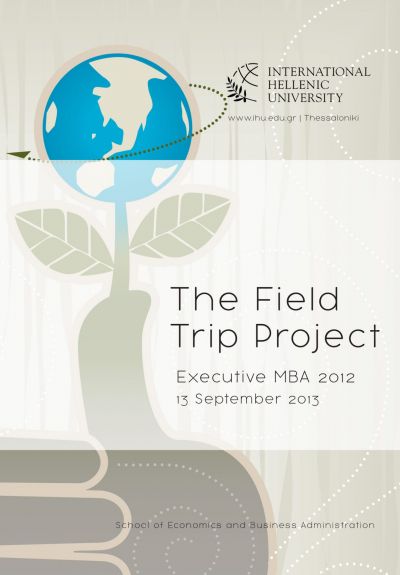
This year’s EMBA field trip cooperates with not-for-profit organizations (NGOs) from Greece, Bulgaria and Albania, with the objective of assisting them in their work and so enhancing their social contribution. The students thus have the opportunity to explore at first hand management practices in different Southeast European countries, while making a direct contribution to society.
The aim of the Field Trip is to integrate theory with practical application within diverse political, cultural, economic and business environments. This past year, the following NGOs were assisted by the Executive MBA 2012 students:
Aliat, Bucharest (Romania)
ALIAT is a not-for-profit association set up in 1993 by mental health professionals active in the field of alcohol and drug addiction treatment. ALIAT aims to develop medical, psycho-social and prevention programs, to improve the health of people suffering from addiction, to train health professionals in the latest evidence-based interventions in this field and lobby for better quality of life and the human rights of drug users in Romania. ALIAT has so far been in professional contact with over 15.000 drug and alcohol users in programs that represented, each, a pioneering intervention in the field of addiction in Romania. Over 600 health professionals participated in various training sessions and ALIAT is regularly consulted by governmental institutions on legal aspects related to drugs and alcohol. ALIAT is, currently, the single most important NGO in the field of alcohol addiction treatment and prevention in Romania.
IPADM, Kozani (Greece)
The Regional Development Institute of Western Macedonia (I.P.A.D.M.) is a non-profit, non-governmental organization (NGO) (Registration No. 485 MFA. / Y.D. DP). Pillars of activity of the Institute are Development, Culture and Environment. Its personnel have the necessary expertise and experience to support and implement similar programs. Using methodical proper planning and scientific documentation, the Institute offers the necessary support in every direction, contributing to the diverse emergence of Western Macedonia. It draws, daily, expertise and experience, which transfers to stakeholders by providing them with support in their work. It is open to all who endorse its purpose and share its vision.
Hope, Sofia (Bulgaria)
The “Hope for the Little Ones” Foundation is a legal entity registered in 1997 and operating under the Law for legal non-profit organizations. The Foundation is an independent, non-religious, self-governing organization and operates in the public interest. The Foundation implements activities primarily supporting the social integration of children being raised in social institutions and deprived of parental care. The main activities of the foundation are focused on raising funds and implementing projects to support small homes in isolated settlements. Substantial support in the realization of projects and programs come from volunteers, made up mostly of students and young families.
Hellenic Rescue Team, Thessaloniki (Greece)
Hellenic Rescue Team is a non-governmental organization of Search and Rescue whose members participate voluntarily in operations since 1978. HRT fundamental objectives are the search and rescue of people in need as well as to provide humanitarian aid inside and outside the country.
Deypsy, Thessaloniki (Greece)
The International Society for Mental Health Services (ISMH), a legal entity of private law, is a non-profit making organization which was founded in 2001 and undertakes to fulfill the task of establishing and running programs aimed at the deinstitutionalization and social rehabilitation of people with psychiatric disorders and severe psychosocial problems.
At the presentation of the students’ Field Trip projects, the NGO representatives expressed their satisfaction with the cooperation and wished to have more opportunities in the future to cooperate with the IHU.
The presentation took place at the IHU on 13 September 2013
Field Trip 2011
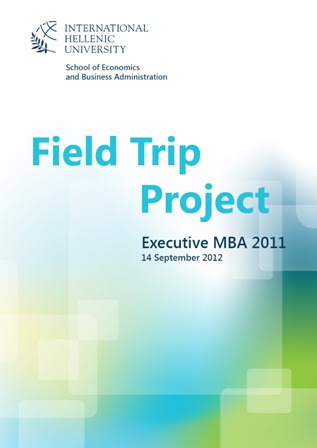
This year’s EMBA field trip cooperates with not-for-profit organizations (NGOs) from Greece, Bulgaria and Albania, with the objective of assisting them in their work and so enhancing their social contribution. The students thus have the opportunity to explore at first hand management practices in different Southeast European countries, while making a direct contribution to society.
The aim of the Field Trip is to integrate theory with practical application within diverse political, cultural, economic and business environments. This past year, the following NGOs were assisted by the Executive MBA 2011 students:
Foundation of Thracian Art & Tradition, Xanthi, Greece
The Thracian Art and Tradition Foundation is a non-governmental and non-profit organization founded in 1998 by Ms Virginia Tsouderou and other friends of Thrace. The primary mission of the Foundation is to preserve, support and promote the Thracian culture and tradition by upgrading the local cultural infrastructure and developing the region’s human capital.
http://www.fthrace.gr/
Stirigma Zois, Thessaloniki, Greece
Stirigma Zois is an NGO dedicated to the support of children. It identifies children that have been abandoned with orphanages due to the economic crisis and the deterioration of their parents’ finances. There is an increasing number of such children today in the Greek society, where parents are unable to feed them properly and have turned for help to the public attorneys and specialized institutions such as ‘Hamogelo tou paidiou’. The purpose of Stirigma Zois is to provide effective support in such cases so that these children may remain with their parents in their family home. This is be done by providing food and other products to meet the children’s needs as well as other services that are normally costly for the family. The goal of the association is to sensitize and mobilize the public to the above problem and raise funds for the effective support of these children.
http://www.stirigmazois.gr
AHEPA, Sofia, Bulgaria
The mission of AHEPA Family is to promote Hellenism, Education, Philanthropy, Civic Responsibility, Family, and Individual Excellence. For instance, philanthropy and volunteerism have been pillars of strength for AHEPA. From natural disaster relief to raising funds for the elimination of life-threatening diseases to making significant contributions to our local neighbourhoods, AHEPA is at the forefront of charitable giving.
http://www.ahepa.org
World Vision, Tirana, Albania
World Vision is an International Christian relief, development and advocacy organization founded in 1950 and dedicated to working with children, families and communities worldwide to help them reach their full potential by directly addressing the causes of poverty and oppression. The Organization is active in 98 countries around the world, serving all people regardless of religion, race, ethnicity or gender.
http://my.worldvision.org/country-profiles/albania
At the presentation of the students’ Field Trip projects, all the NGO representatives expressed their satisfaction with the cooperation and wished to have more opportunities in the future to cooperate with the IHU.
The presentation took place at the IHU on 14 September 2012
Field Trip 2010
This year’s EMBA field trip cooperates with not-for-profit organizations (NGOs) from Greece, Albania, FYROM and Romania with the objective of assisting them in their work and so enhancing their social contribution. The students thus have the opportunity to explore at first hand management practices in different Southeast European countries, while making a direct contribution to society.
The aim of the Field Trip is to integrate theory with practical application within diverse political, cultural, economic and business environments. This past year, the following NGOs were assisted by the Executive MBA 2010 students:
- Alma Zois – Greece: Founded in 2008 by women with breast cancer experience to provide help to other women to acquire a better quality of life, their mission is to offer mutual aid, psychological support & rehabilitation to women & their families. http://www.almazois.gr
- Hellenic Children’s Village: Their mission is the permanent and long-term care, education, shelter and psychological support of children on the basis of a Greek- Orthodox tradition. http://www.paidikoxorio.gr
- ECOREC – Greece: The main objectives of ECOREC, among others, are: The reduction and the environmental management of waste, the sustainable management of natural resources and energy and the raising of the public awareness. http://www.ecorec.gr
- Fair Trade Hellas: Their goal is the promotion of ethical and responsible consuming in Greece together with the provision of products from small producers in poor countries. http://www.fairtrade.gr/
- CeProSARD (FYROM): Their full name is the Centre for Promotion of Sustainable Agricultural Practices and Rural Development. Their mission is to introduce and promote sustainable rural development in the country. http://www.ceprosard.org.mk/
- Red Cross Albania: Core activities include the promotion of humanitarian values, prompt intervention in catastrophes and humanitarian aid to people affected by them. http://www.ifrc.org/en/what-we-do/where-we-work/europe/albanian-red-cross/
- Centrul de Resurse Ecopolis – Romania: The Centre for Sustainable Policies is a new environmental NGO, established in 2010, with the purpose of turning the principles of sustainable development into laws. http://www.ecopolis.org.ro
At the presentation of the students’ Field Trip projects, the representatives from ECOREC, Ms Katia Makrinika, expressed her satisfaction with the cooperation with the EMBA students and pointed out the importance of their help in some managerial issues, where the NGO administrators did not have the specific knowledge and experience.
From the Executive MBA students’ perspective, Roden Pajaj said that the Field Trip project was valuable because it puts into practice many different fields of knowledge such as marketing, negotiation skills, business strategy and project management. “It is a real assessment of all the knowledge gained during the previous months”.
The presentation took place at the IHU on 9 September 2011
Field Trip 2009
This year’s EMBA field trip cooperates with Greek, Albanian, and Romanian not-for-profit organizations with the objective of assisting them in their work and so enhancing their social contribution. The Greek-based not-for-profit organizations involved this year are Greek Food Bank, Doctors of the World, Down Syndrome Association of Greece while some student groups are working with Heifer International and Hospice-Casa Sperantei in Albania and Romania respectively.
- Greek Food Bank, based in Athens, fights against hunger and waste. It disseminates to those in need (e.g., elderly people, orphans, disabled, and homeless) donations of food, beverages and other items in good condition and proper quality, within their expiration dates. http://www.foodbanking.org
- Doctors of the World (DW) is an international humanitarian aid organization that provides aid to vulnerable populations around the world. DW provides independent and impartial support to those most in need. http://www.mdmgreece.gr
- Down Syndrome Association of Greece is based in Thessaloniki. It caters for the welfare of children with Down Syndrome and provides information and support to parents. http://www.down.gr
- Heifer International – Albania is a not-for-profit humanitarian organization dedicated to combat world hunger by providing livestock, trees, training, and other resources to help families in need to become self-reliant. http://www.heiferalbania.org.al
- Hospice-Casa Sperantei (HCS), located in Romania, believes that any person diagnosed with an incurable disease, at an advanced stage, has the right to quality care to alleviate suffering and control distressing symptoms. HCS is the first not-for-profit organization of this kind operating in Romania. http://www.hospice.ro
Field Trip 2008
This year’s EMBA field trip cooperates with Albanian, Bulgarian and Greek not-for-profit organisations with the objective of assisting them in their work and so enhancing their social contribution. The Greek-based not-for-profit organisations involved this year are Arcturos, Callisto, Doctors Without Frontiers, Hellenic Rescue Team and Sotir while student groups are working with the WWF and Eden in Bulgaria and Albania respectively.
- Arcturos, based in Thessaloniki, has been working for the conversation of large carnivores and their habitats both in Greece and the Balkans. Through applied research it gathers information that allows dynamic intervention in cases where important habitats are threatened or destroyed by large technical works such as roads, dams, quarries and so on. http://www.arcturos.gr/
- Callisto, which is situated in Thessaloniki, aims at the protection of the environment as a public and collective commodity. Some of their concerns are related with the protection of the bear, the wolf and the extinction of the lynx. http://www.callisto.gr/
- Medecins Sans Frontieres (MSF)/ Doctors Without Borders is an international humanitarian aid organisation that provides aid in nearly 60 countries to people whose survival is threatened by violence, neglect, or catastrophe, primarily due to armed conflict, epidemics, malnutrition, exclusion from health care, or natural disasters.
MSF provides independent, impartial assistance to those most in need. In 1999, MSF received the Nobel Peace Prize. MSF-Greece was founded in 1990 in Athens. http://www.msf.gr/ - The Eden Centre in Tirana, Albania, targets at the development of a sustainable and healthy environment. Its current focus is on environmental education, waste management and local-capacity building especially in NGOs. http://www.powerfulinformation.org/page.cfm?pageid=pi-eden
- Hellenic Rescue Team is a non-governmental organization of Search and Rescue whose members participated voluntarily in operations since 1978. HRT fundamental objectives are the search and rescue of people in need as well as to provide humanitarian aid inside and outside the country. https://hrt.org.gr/
- Sotir, based in Thessaloniki, caters for the welfare of paraplegic people as well as people with special needs.
- WWF, located in Sofia, Bulgaria, has worked since 1998. Its main objectives are the conservation and restoration of biodiversity in the region. http://bulgaria.panda.org/

